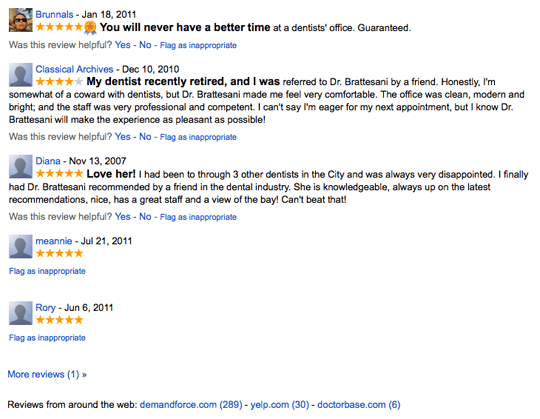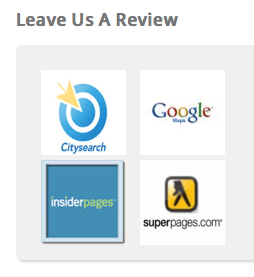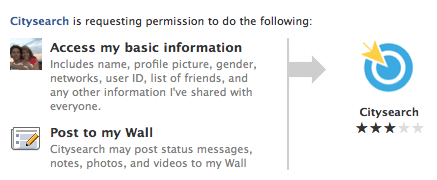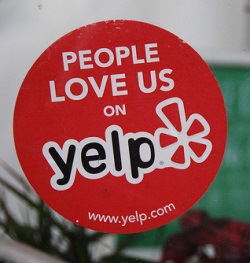If Local Search was a building, it was look something like this…

There are new things being added, subtracted, re-arranged, re-named, left unfinished, and stolen all the time in the industry. We have seen the rise of deals, check-ins, mainstream local results in SERP’s, review fights between the giants, and countless other methods of connecting local businesses to customers.
Because of this, the local search industry has developed the phenomena of “storm chasers”. Meaning those that will change their strategy often. Run to every new update, and try to be the first to find the “secret” that will cash out quickly until the next big storm comes.
Example
This past week Google Places made a few cosmetics changes which “disapparated” citations from the Places page which stopped counting and highlighting 3rd party reviews. This is what the search results look like now:

And here for the Places page review section, only Google reviews are showing and 3rd party sites have been relegated to links below.

The Citations have already been discussed, but I wanted to put in my two-bits in. A storm chaser would translate this update as a mad dash for Google Places reviews. They would forget 3rd party sites (Yelp, Citysearch, etc.) and make sure that when their listing are compared with others on Google Places competitors, they would have the most reviews. Instead, it would be a wise thing to focus on the 3 pillars of local search reviews. The pillars are never changing, as they hold up the entire review strategy for the local search industry.
One: Diversity
Reason
Google has put ranking weight on the number of different sites with business reviews. Now is that reason enough to diversify? If not, how about the countless issues that Google has had with misplacing reviews? More importantly, Google Places is not the only way that people find information about a business.
The Yelp mobile app in the Apple Store currently has 105,969 reviews while Google Places has 2373 reviews. Also, some industries have review specific sites (think Urbanspoon) that provide a great gathering system for the food industry. A site like CitySearch.com’s reviews can be left with a simple Facebook login, and their reviews feed to both Bing and Google (now as a link) and also has an impressive amount of people searching on their network as a stand-alone site.
Ideas:
- Incorporate review links on your website (I generally like to have 4 different portals) that cover all your bases.

- Ask your Facebook friends to leave you reviews on CitySearch

- If you are in a popular Yelp industry or place, then print out and highlight some of your reviews in your place of business.

- If you have an email list, find all the gmail users and send an email asking for reviews on Google Places. If they have a yahoo address send them a link to yahoo local. And if they have a Hotmail address, then send them an invite for gmail 😉
The key is to make sure you don’t just do one thing to get reviews. Incorporate a lot of methods, but make sure you do have a list of sites that you want promote reviews on and try to guide people there. Most users have one they prefer in the top 4-5 review sites.
Two: Consistency
Reason
Like most forms of user generated content; reviews are extremely difficult to work into your daily business. Most companies I see get really excited for a while and will get a plethora of reviews, then go months without asking for them. Here are a few reasons to have a steady flow of reviews…
- It looks natural. Getting reviews in mass amounts quickly seems extremely spammy.
- People look at dates of reviews. If they see recent reviews the trust level goes up substantially in determining business quality.
- You are constantly getting feedback on your product or service.
Ideas
- Create a review pamphlet that sits in a prominent place in your business and can be passed out in bags or with receipts.
- Include links to review portals in your emails as part of your signature.
- Include review information on invoices or receipts.
- Set up a calendar with a different review campaign each month (with alarm notices so you don’t forget)
The key is to simply make the decision that reviews are important to your business, and not give up or give in. Nobody in your space will be able to compete long term against a consistent strategy.
Three: Reliability
Reason
Contrary to popular belief, reliability centers around bad and mediocre reviews. While most business owners would do anything to have a 5 star business, a normal business cannot avoid criticism. Nothing sends a flag to users more than a plethora of 5 star reviews with no mention of 4’s, 3’s, or 2’s. So, don’t be afraid to let anyone and everyone leave a review. An employee might make a mistake, or you might come up against a mean old nag. A perfect business isn’t one with perfect reviews, it’s one that deals with their reviews and feedback perfectly. As long as you promote people leaving reviews, then you should end up with a very accurate portrayal of your business. Feedback can help you to progress in areas of need.
Comments from the owners/managers on reviews are also very important. It’s a voice that a business can portray in response to negative, and positive, feedback alike. By responding, you show that you are real.
Don’t buy reviews. But if I can’t stop you then make sure that the reviews are a mix of feedback. Mostly good, sometimes mediocre, and once in a while bad.
Ideas
- Highlight a review a month on posters in your business. People who come in will see you are actively monitoring + promoting reviews and will trust what they see + read.
- Set up for a paid service like Steprep.com which will notify you any time a review is published so that you can act accordingly.
- If you want to take a chance, highlight both positive reviews, and no so positive reviews on a testimonials page, and explain what you have done to remedy the problem.
- Have a history of reviews. When I read hotel reviews where there are 100’s or 1000’s of reviews, I know that there is no way they can all be fabricated. When I see a business with 2-3 reviews…I wonder.
Build the Pillars
It might be a lot easier to have a storm chaser focused strategy. People do it all the time with links and citations, but they are not seen and read by your customers the way a review is. If you do one thing right in local, make it your reviews. Build on a strong and diverse platform that will allow you roll with the changes with ease because your strategy will be based on pillars.



![[SEO, PPC & Attribution] Unlocking The Power Of Offline Marketing In A Digital World](https://www.searchenginejournal.com/wp-content/uploads/2025/03/sidebar1x-534.png)